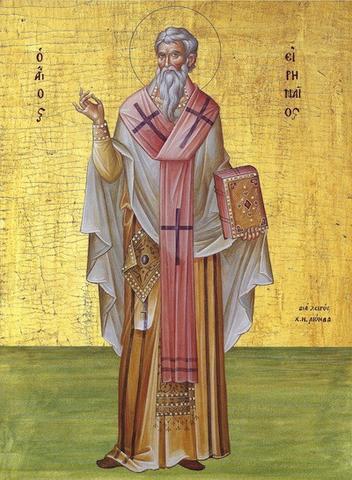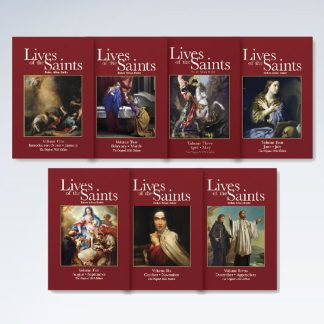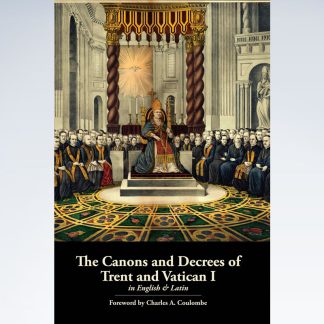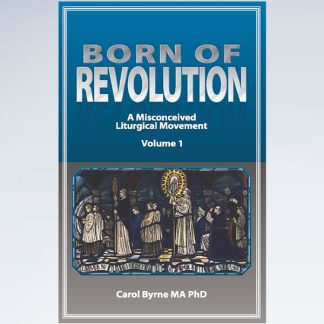

St. Irenaeus of Lyons lived from about 130 to 200 AD. He was a disciple of St. Polycarp, who was himself a disciple of St. John the Apostle. St. Irenaeus’ main work Against Heresies gives insight into the world of the early Church. Feast day June 28.
Now you can listen to St. Ireneaus’ Against Heresies in a newly released audio version of this work from LibriVox. This is an actual reading of the text, not some computer audio voice. The entire text can be listened to or downloaded for listening later at no charge and the recordings have been released into the public domain.
Some quotes from Saint Irenaeus
“Wherefore we must obey the priests of the Church who have succession from the Apostles, as we have shown, who, together with succession in the episcopate, have received the certain mark of truth according to the will of the Father; all others, however, are to be suspected, who separated themselves from the principal succession.” Against Heresies, (Book IV, Chapter 26)
“But it is not possible that the Gospels can be either more or fewer in number than they are. For since there are four zones of the world in which we live, and four principal winds, while the church has been scattered throughout the world, and since the ‘pillar and ground’ of the Church is the Gospel and the spirit of life, it is fitting that she should have four pillars, breathing incorruption on every side, and vivifying human afresh. From this fact, it is evident that the Logos, the fashioner demiourgos of all, he that sits on the cherubim and holds all things together, when he was manifested to humanity, gave us the gospel under four forms but bound together by one spirit.” Against Heresies, 3.11.8
“Even though Eve had Adam for a husband, she was still a virgin […] By disobeying, Eve became the cause of death for herself and for the whole human race. In the same way Mary, though she had a husband, was still a virgin, and by obeying, she became the cause of salvation for herself and for the whole human race.” Against Heresies, 3:22
“Error, indeed, is never set forth in its naked deformity, lest, being thus exposed, it should at once be detected. But it is craftily decked out in an attractive dress, so as, by its outward form, to make it appear to the inexperienced (ridiculous as the expression may seem) more true than the truth itself.” Against Heresies (Book I)

-
 Butler’s ORIGINAL Lives of the Saints – Complete Set (January – December)US$ 299.00
Butler’s ORIGINAL Lives of the Saints – Complete Set (January – December)US$ 299.00 -
 The Limits of Papal Authority over the LiturgyUS$ 27.00
The Limits of Papal Authority over the LiturgyUS$ 27.00 -
 The Canons and Decrees of Trent and Vatican I (In English and Latin)US$ 19.00
The Canons and Decrees of Trent and Vatican I (In English and Latin)US$ 19.00 -
 Against the Heresies by Archbishop LefebvreUS$ 25.00
Against the Heresies by Archbishop LefebvreUS$ 25.00 -
 “Born of Revolution: A Misconceived Liturgical Movement” by Dr. Carol Byrne (PDF File)US$ 10.00
“Born of Revolution: A Misconceived Liturgical Movement” by Dr. Carol Byrne (PDF File)US$ 10.00 -
 The Popes Against Modern Errors: 16 Papal DocumentsUS$ 24.00
The Popes Against Modern Errors: 16 Papal DocumentsUS$ 24.00
VIRGÓ SACRÁTA is a Christian mission-driven online resource and shop inspired from the beauty of Catholic faith, tradition, and arts. Our mission is to “Restore All Things to Christ!”, in continuing the legacy of Pope St. Pius X under the patronage of the Blessed Virgin Mary. “Who is she that cometh forth as the morning rising, fair as the moon, bright as the sun, terrible as an army set in battle array?” O Mary, conceived without sin, pray for us who have recourse to Thee.


